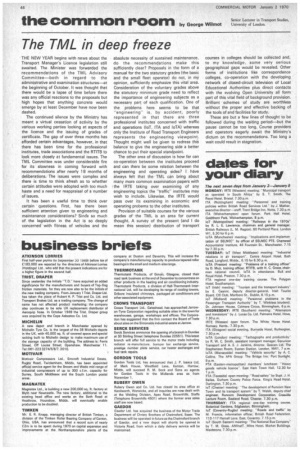The TML in deep freeze
Page 48

If you've noticed an error in this article please click here to report it so we can fix it.
• THE NEW YEAR begins with news about the Transport Manager's Licence legislation still awaited. The Minister was forwarded the recommendations of the TML Advisory Committee—both in regard to the administrative and examination structures—at the beginning of October. It was thought that there would be a lapse of time before there was any official reactions to the proposals but high hopes that anything concrete would emerge by at least December have now been dashed.
The continued silence by the Ministry has meant a virtual cessation of activity by the various working parties looking at aspects of the licence and the issuing of grades of certificate. The gap of over three months has afforded certain advantages, however, in that there has been time for the professional institutes, trade associations and the RTITB to look more closely at fundamental issues. The TML Committee was under considerable fire for its slowness in coming forward with recommendations after nearly 18 months of deliberations. The issues were complex and there is time to think afresh as to whether certain attitudes were adopted with too much haste and a need for reappraisal of a number of issues.
It has been a useful time to think over certain questions. First, has there been sufficient attention given to engineering and maintenance considerations? Sinde so much of the legislation in the Act is so deeply concerned with fitness of vehicles and the absolute necessity of sustained maintenance, do the recommendations make this sufficiently clear? Proposals in the form of a manual for the two statutory grades (the basic and the small fleet operator) do not, in my opinion, sufficiently emphasize this vital area. Consideration of the voluntary grades above the statutory minimum grade need to reflect the importance of engineering subjects as a necessary part of each qualification. One of the problems here seems to be that "engineering" is, by accident, poorly represented in that there are three professional institutes concerned with traffic and operations (loT, 1TA and loTA) whereas only the Institute of Road Transport Engineers represents the engineering viewpoint. Thought might well be given to redress this balance to give the engineering side a better chance to put their special standpoint.
The other area of discussion is how far can co-operation between the institutes proceed and can there be some relation between the engineering and operating sides? I have always felt that the TML can bring about many more common examination papers with the IRTE taking over examining of any engineering topics the "traffic" institutes may wish to include. Likewise, the IRTE would pass over its examining in economic and operating probems to the other institutes.
Provision of suitable courses for the various grades of the TML is an area for current thought. A survey of the present (and I do mean this session) distribution of transport courses in colleges should be collected and to my knowledge, some very serious geographical gaps would be revealed. Other forms of institutions like correspondence colleges, co-operation with the developing network of closed-circuit television of Local Educational Authorities plus direct contacts with the evolving Open University all form part of this vital field of background provision. Brilliant schemes of study are worthless without the proper and effective backing of the tools of and facilities for study.
These are but a few lines of thought to be followed during the waiting period but the pause cannot be too long. Course providers and operators eagerly await the Ministry's dictum on the recommendations. Too long a wait could result in stagnation.




















































































